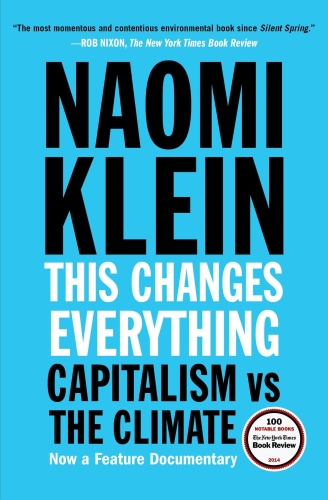

| THIS CHANGES EVERYTHING Capitalism Vs. the Climate Naomi Klein New York: Simon & Schuster, August 2015 |
Rating: 5.0 High |
|||
| ISBN-13 978-1-4516-9739-1 | ||||
| ISBN-10 1-4516-9739-2 | 564pp. | SC | $16.99 | |
There is this about a global change: it affects everyone on the globe. Some may feel — by their actions must feel — that wealth or power insulates them from the global changes that we humans are driving by ramping up the concentration of greenhouse gases in Earth's atmosphere. And those things may protect them for a time. But how can wealth protect you from starvation when there is no food to buy? How can power stave off hordes of climate refugees when those who might have wielded power in your defense have fled? What might can build you a bulwark against the rising seas when the materials to build more walls are gone, and the builders too?
You may think I exaggerate, that I play the fearmonger. Indeed, that has been a common theme from the beginning of this crisis: Mock the warnings as the maunderings of Chicken Littles crying "The sky is falling." No one says the sky is falling except those who dismiss any possibility of harm. But harm impends. If it will not come tomorrow, still it is coming. If it will not wipe out humanity, still it will make life extremely unpleasant for the humans who remain a generation from now — if we do nothing.
Our choice is simple: endure some pain today, or consign our sons and daughters to a hell of pain on Earth. Look at Iraq. Look at Afghanistan. Look at Aleppo in Syria — cities, even whole nations, devastated by strife. Estimates are that 64.8 million people have been displaced by regional conflicts, and another 22 million by extreme weather. How much worse could it get when the industrialized nations face the same disruptive forces? Who would guarantee nuclear weapons would not be used, when the survival of those nations is at stake?
Well, you might argue, maybe I'm wrong. Maybe things won't get so bad. Or maybe we'll come up with a slick techno-fix. Maybe so. But how much would you bet? Here's the thing: We know what happened in the past when greenhouse gases reached the concentrations we are driving them to. No credible evidence has been raised to show that science is wrong. We also know what might be done technically to fix things once the CO2 concentration gets that high, and so far it's all either unaffordable or fraught with unintended consequences or both. Feel free to gamble the future of human civilization on wish fulfillment, but don't be surprised if no one joins you.
And for those who cling to reliance on the magic of the market: know that capitalism has a poor track record of solving problems like this. Every environmental problem that cropped up over the past century was deemed ruinously expensive to solve. Never mind the fact that when government finally overcame corporate resistance, every problem proved to be far less costly than predicted. History is no guide to capitalists. They always cut all the corners they can, while neglecting the real damage their corner-cutting causes.1
"The idea that capitalism and only capitalism can save the world from a crisis created by capitalism is no longer an abstract theory; it's a hypothesis that has been tested and retested in the real world. We are now able to set theory aside and take a hard look at the results: at the celebrities and media conglomerates that were supposed to model chic green lifestyles who have long since moved on to the next fad; at the green products that were shunted to the back of the supermarket shelves at the first sign of recession; at the venture capitalists who were supposed to bankroll a parade of innovation but have come up short; at the fraud-infested, boom-and-bust carbon market that has failed miserably to lower emissions; at the natural gas sector that was supposed to be our bridge to renewables but ended up devouring much of their market instead. And most of all, at the parade of billionaires who were going to invent a new form of enlightened capitalism but decided that, on second thought, the old one was just too profitable to surrender." – Page 252 |
Capitalism can come up with solutions for environmental problems, and has done so quite often — but only when government supplies the incentive. The same is true for climate change; but corporations and their allies in American government steadfastly resist the measures we know will be effective. Those measures are:
That last measure can be tricky to accomplish, since it potentially penalizes free speech. Yet it should be as reprehensible to absolve the release of a pollutant into the environment as it is to absolve the murder of innocent children. We've come to understand the truth of that for pollutants like arsenic and mercury, for industrial chemicals like ammonia and silane. We are halfway to understanding the danger of petroleum spills and the dispersants that are used to hide those spills (and the science on this has long been solid enough to trust.) The science is equally solid on the dangers to be expected from continuing to release greenhouse gases; it is only public understanding of this danger that lags. Every citizen should understand the reason why that lag exists: It is the disinformation campaign that has been going on for decades.
It is high time for the disinformation to stop — and high time for citizens to step up to their civic duty. That duty includes the obligation to exercise some skepticism toward the promises of those who seek to lead them.

 To contact Chris Winter, send email to this address.
To contact Chris Winter, send email to this address.